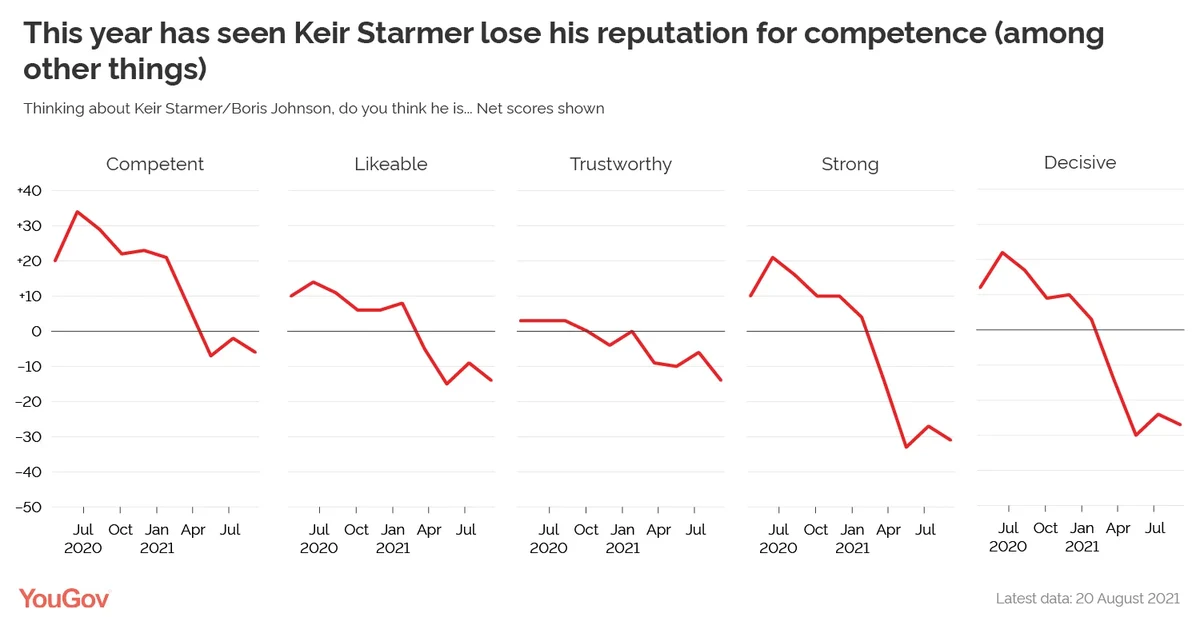As he prepares for his first in-person conference speech as Labour leader, it’s fair to say Starmer’s first 18 months in the job have been pretty disrupted by the pandemic. Now life has begun to return to some sort of normality, it seems any allowances the public were willing to give the Labour leader have now expired, with their verdict of his performance to date far from flattering.
Just one in ten Britons (10%) think he’s been a “good” or “great” leader since taking the job, compared to 34% who say “average”, and 39% who say he’s done a “poor” or “terrible” job. This constitutes a hefty drop in approval since spring, when 21% of the public rated his performance as good or better. 2019 Labour voters also seem uninspired by the job he has done. The largest portion of these voters (43%) say he’s done an average job, while they are more likely to say he has done a poor/terrible job (27%) than a good or great one (20%). Perhaps most damning though is that this same group are also now marginally more likely to say he should stand down (41%) than remain as leader (37%).
One key area that Starmer has pledged to address in his speech this afternoon is his vision for Labour, and the data shows how necessary this will be. By 60% to 15%, the public say he’s done a bad job at setting out Labour’s vision thus far, a view that is shared by Labour voters (55% to 26%). Looking specifically at the economy, just 35% of those who backed Labour at the last election think the party’s policies are clear. Additionally, by 44% to 30% they say he’s done a bad job at convincing the public that the party can be trusted on this issue. If Starmer is to convince his core voters he can lead the party to election victory, then he is going to have to improve his message on the economy and other issues beyond those where Labour traditionally poll well.
A common theme of Labour conferences over the last few years has been party unity (or lack thereof), and this year has been no different, with leadership rule changes and shadow cabinet resignations prominently featuring. As things stand, there is still a lot of work to do in this regard, with our latest tracking data showing 53% of the public see the Labour party as divided and just 10% saying it’s united. While not quite as bad as things were just prior to his appointment – when 68% of the public saw the Labour party as divided – there’s clearly still work to be done in ensuring the leadership is focussed on improving the country rather than distracted putting out internal fires.
Just 16% of the public say that Keir Starmer looks like a Prime Minister in waiting, and the jury has been out for a while on several of his leadership qualities (likability, strength, trust). However, his competence as a leader was one area where he consistently performed well, particularly when compared to the Prime Minister. At the start of the year his net score on competence was +21 (42% competent vs 21% not competent) but this has since dropped off to -6 (29% vs 35%) earlier this month.

While it’s clear that Starmer is facing his most difficult period as leader, there is still a long way to go before the next election and there is certainly time for him to get out of this hole. After a disrupted first 18 months, he no longer has excuses to hide behind and it is critical that he can rapidly start to convince the public that he is the right person to lead Labour into the next election. Against a Prime Minister known for gaffes, regaining his reputation as a competent candidate is crucial, but it is also important for him to improve his other characteristics if his party is to be successful. Beyond his personal attributes, clarity on policies and his direction for the party will be pivotal and today’s speech needs to be the start of this.
See results here and below
Keir Starmer attribute tracker results: trustworthy / competent / likeable / strong leader / decisive
Other trackers: should resign / Labour unity / PM in waiting







